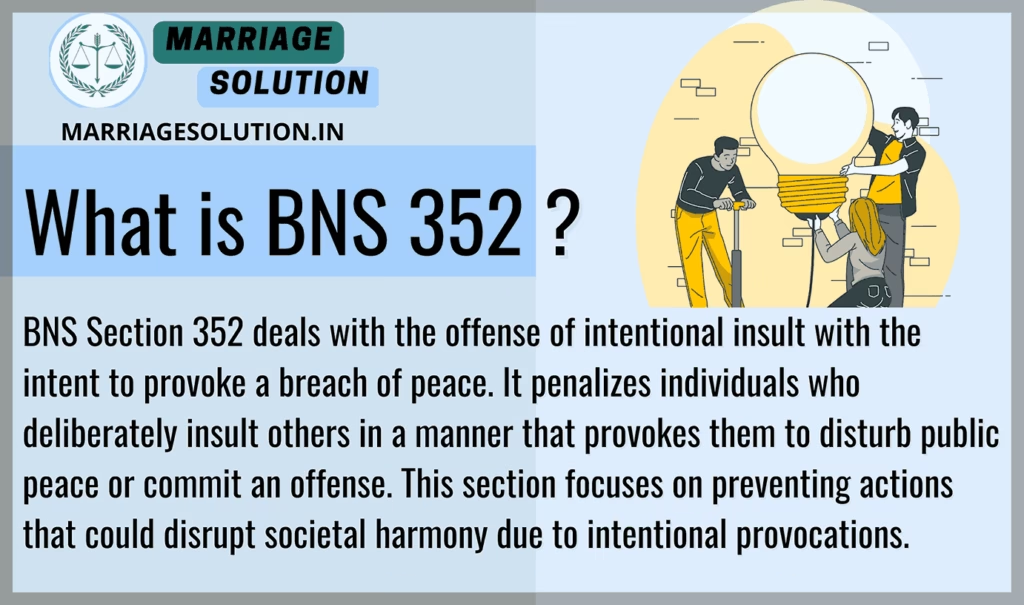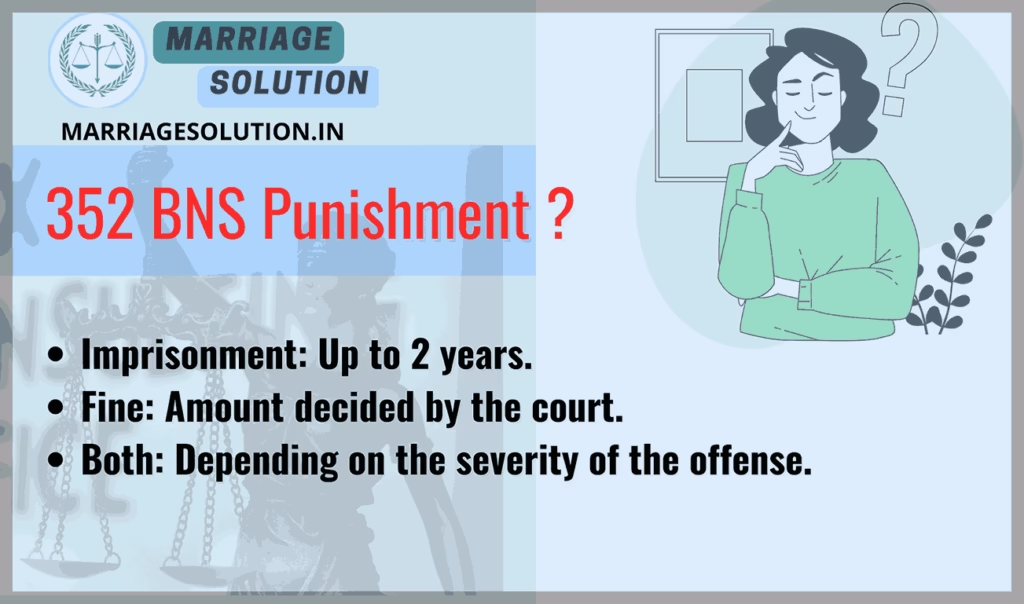Introduction of 352 BNS
352 BNS deals with intentional insult made with the purpose of provoking a breach of peace. This provision ensures that deliberate insults, whether verbal, written, or symbolic, that can incite anger or violence are legally punishable. By replacing the old IPC Section 504, BNS 352 modernizes the law to protect public harmony, discourage provocative acts, and maintain societal order. It plays a key role in preventing conflicts caused by intentional insults in public or private interactions.
The Bharatiya Nyaya Sanhita (BNS) Section 352 replaces the old Indian Penal Code (IPC) Section 504.
What is BNS Section 352 ?
BNS Section 352 deals with the offense of intentional insult with the intent to provoke a breach of peace. It penalizes individuals who deliberately insult others in a manner that provokes them to disturb public peace or commit an offense. This section focuses on preventing actions that could disrupt societal harmony due to intentional provocations.

Under Section 352 of the bns act 2023
Whoever intentionally insults another person, intending or knowing that such insult is likely to provoke them to break the public peace or to commit an offense, shall be punished with imprisonment up to two years, or with fine, or with both.”
1. Meaning of Intentional Insult
- Intentional insult → A deliberate act of abusing, mocking, or humiliating another person.
- It must be done with purpose, not by accident or casual misunderstanding.
- Can be in verbal, written, symbolic, or online form.
Example → Publicly abusing someone with offensive language to provoke a fight.
2. Essential Ingredient – Provocation to Breach Peace
- The insult must be such that it is likely to provoke the victim into disturbing public peace.
- Even if no actual breach happens, the possibility or likelihood is enough.
- Covers situations where insults may escalate into arguments, violence, or unrest.
Example → Mocking a person’s religion during a festival, knowing it may lead to clashes.
3. Punishment under BNS Section 352
- Imprisonment → Up to 2 years.
- Fine → Amount decided by the Court.
- Both → Court may impose both imprisonment and fine depending on severity.
The court decides punishment based on nature of insult, consequences, and impact.
4. Nature of the Offense
- Bailable → Accused can seek bail as a matter of right.
- Non-Cognizable → Police cannot arrest or investigate without magistrate’s permission.
- Non-Compoundable → Cannot be settled privately between parties.
- Trial By → Any Magistrate.
5. Examples of BNS Section 352 in Action
- Example 1 – Public Verbal Insult:
A man abuses another in a crowded market, intending to provoke a fight. → Punishable under Section 352. - Example 2 – Social Media Insult:
Someone posts offensive comments about a community on Facebook, knowing it may cause unrest. → Covered under Section 352. - Example 3 – Non-Offense (No Intent):
A person unknowingly makes a rude comment without intention to provoke. → Not punishable under this section.
6. Importance of Section 352
- Protects public peace and harmony.
- Prevents unrest caused by provocative insults.
- Ensures responsible use of speech and expression.
- Deters people from using insults as weapons in disputes.
Section 352 BNS Overview
Detailed Explanation of 10 Key Points of BNS Section 352
1. Act of Intentional Insult
Under Section 352, the offender must intentionally insult someone. The word “intentional” implies that the insult is deliberate and purposeful, rather than accidental or incidental. This includes verbal abuse, written statements, or actions that are clearly directed to demean or provoke another individual.
2. Provocation to Break Public Peace
The insult must provoke the person to a point where they are likely to disrupt public peace. This means the insult leads to a reaction that could disturb the order in a community or public setting. It emphasizes protecting societal harmony by discouraging actions that might lead to chaos or unrest.
3. Intention or Knowledge
The offender must either intend for their insult to provoke a breach of peace or know that it is likely to do so. This highlights the mental state of the accused, which is crucial for determining guilt under this section. The focus is not just on the insult itself but also on the awareness or intention behind it.
4. Punishment
The section prescribes punishment as imprisonment of up to two years, a fine, or both. The court has discretion to decide the severity of the punishment based on the circumstances of the case, the offender’s intent, and the impact of the insult.
5. Non-Cognizable Offense
Being a non-cognizable offense means that the police cannot arrest the accused or start an investigation without prior approval or direction from a Magistrate. This safeguard ensures that the law is not misused for minor disputes.
6. Bailable Offense
Since the offense is bailable, the accused has the right to seek bail, and the court or the police must grant it upon application. This classification recognizes the relatively less severe nature of the offense compared to more serious crimes.
7. Non-Compoundable Offense
The offense is non-compoundable, which means it cannot be resolved through mutual agreement or settlement between the parties involved. The state prosecutes the case to maintain public order, and private reconciliation cannot override the legal process.
8. Triable by Any Magistrate
Cases under this section can be tried by any Magistrate, ensuring that the judicial process is accessible and does not require special courts or higher-level judicial intervention. This simplifies the procedural aspects of handling such cases.
9. Protection of Public Peace
The primary objective of this section is to maintain public peace and discourage individuals from engaging in behavior that could incite disturbances. By penalizing intentional insults, the law aims to deter provocations that can escalate into larger conflicts.
10. Scope of Application
The scope of this section is broad, covering insults made in various forms, including spoken words, written communication, gestures, or actions. However, the law only applies if the insult provokes or is likely to provoke a breach of peace. This ensures that minor disagreements or harmless insults are not unnecessarily penalized.
Examples of BNS Section 352
Example 1: Public Verbal Insult
A person publicly mocks another individual’s religion during a festival, intending to provoke anger. This leads to a heated argument, disturbing the event’s peace. The offender can be charged under BNS 352 for intentional insult likely to provoke a breach of peace.
Example 2: Provocative Social Media Post
Someone posts offensive comments on social media targeting a particular community, intending to provoke reactions. The post results in public outrage and protests. The person responsible for the post may be punished under BNS 352 for their provocative actions.
BNS 352 Punishment
- Imprisonment: Up to 2 years.
- Fine: Amount decided by the court.
- Both: Depending on the severity of the offense.

BNS 352 bailable or not ?
This offense is bailable, meaning the accused has the right to secure bail upon arrest. It is also non-cognizable, so the police cannot arrest or investigate the matter without the prior permission of a Magistrate.
Comparison: BNS Section 352 vs IPC Section 504
| Section | Offense | Punishment | Bailable / Non-Bailable | Cognizable / Non-Cognizable | Trial By |
|---|---|---|---|---|---|
| BNS Section 352 | Intentional insult made with intent to provoke another person to breach public peace or commit an offense. | Imprisonment up to 2 years, or fine, or both. | Bailable | Non-Cognizable | Any Magistrate |
| IPC Section 504 (Old) | Intentional insult with intent to provoke breach of peace or commit any other offense. | Imprisonment up to 2 years, or fine, or both. | Bailable | Non-Cognizable | Any Magistrate |
BNS Section 352 FAQs
What is BNS Section 352?
BNS Section 352 penalizes individuals who intentionally insult others with the intent to provoke a breach of peace or any other offense.
What type of offense does BNS Section 352 cover?
It covers intentional insults where the offender knows or intends that their actions are likely to provoke someone to disturb public peace or commit an offense.
What is the punishment under BNS Section 352?
The punishment includes imprisonment of up to two years, a fine, or both, depending on the severity of the offense.
Is the offense under BNS Section 352 bailable?
Yes, the offense is bailable, meaning the accused has the right to bail upon arrest.
Is BNS Section 352 a cognizable or non-cognizable offense?
It is a non-cognizable offense, meaning the police require prior approval from a Magistrate to arrest or investigate the accused.
Who tries cases under BNS Section 352?
Cases under BNS Section 352 are triable by any Magistrate, ensuring accessible and straightforward judicial proceedings.
Conclusion
BNS Section 352 safeguards public peace by penalizing intentional insults that may provoke violence or unrest. By ensuring that deliberate provocations are treated seriously, the law protects individual dignity while maintaining social harmony. The section strikes a balance between freedom of speech and public order, making it an important legal safeguard against conflicts in modern society.
Need Legal Support?
If you are dealing with court cases, marriage problems, or any other legal issue, our team at Marriage Solution – Lawyer Help is here for you. Simply fill out our quick online enquiry form, and we’ll connect you with the right legal expert to support your needs.
Finished with BNS 352 ? Continue exploring the next provisions of the Bharatiya Nyaya Sanhita (BNS), 2023. Each section includes explanations, examples, and plain-language breakdowns for easy understanding.
- 353 BNS : Statements conducing to public mischief .
- https://marriagesolution.in/bns_section/353-bns/
- 354 BNS : Act caused by inducing person to believe that he will be rendered an object of the Divine displeasure .
- https://marriagesolution.in/bns_section/354-bns/
- 355 BNS : Misconduct in public by a drunken person .
- https://marriagesolution.in/bns_section/356-bns/
Of Defamation .
- 356 BNS : Defamation.
- https://marriagesolution.in/bns_section/356-bns/
- 357 BNS : Breach of contract to attend on and supply wants of helpless person.
- https://marriagesolution.in/bns_section/357-bns/
Full IPC Section List: https://marriagesolution.in/ipc-section-list
All Indian Law & Blogs: https://marriagesolution.in/indian-law/
Full BNSS Section List: https://marriagesolution.in/bnss_section-list
